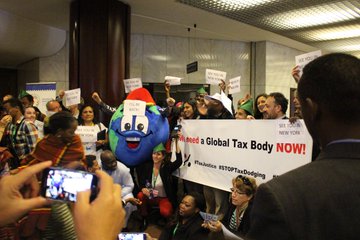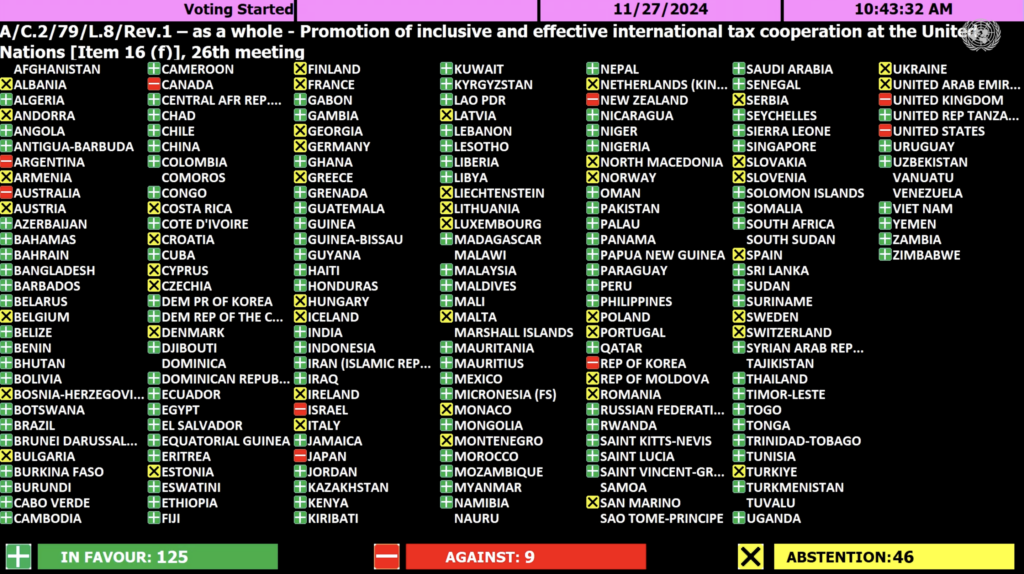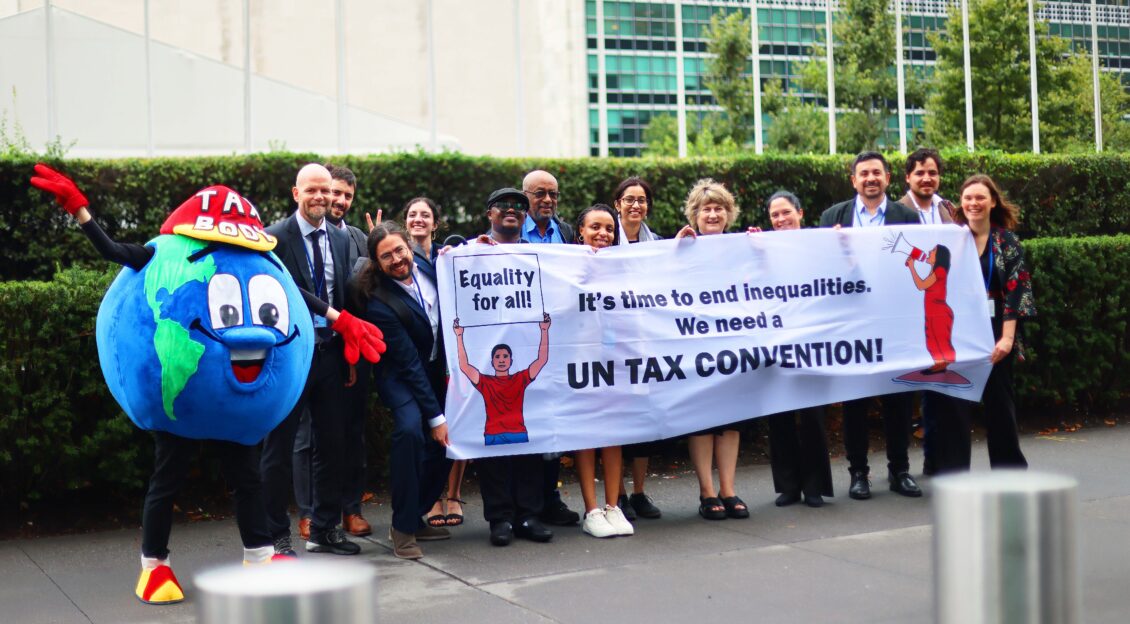As we near the February UN Tax Convention organisational session, let’s unpack what has happened and what is to come in the negotiations for a United Nations Framework Convention on International Tax Cooperation.
Setting the scene: why a UN Tax Convention?
From February 3-6th, negotiations will officially begin on the United Nations Framework Convention on International Tax Cooperation (UN Tax Convention). Why is this legally binding agreement so crucial for issues from tackling inequality to financing sustainable development?
Everyday, over a billion USD are lost to tax abuse by multinational corporations and the ultra-rich, a result of the broken international tax system. For the past decade, the Global Alliance for Tax Justice (GATJ) has campaigned for an intergovernmental tax body at the UN so that countries can effectively address tax abuse and illicit financial flows to deliver sustainable public finance and address inequalities. Jeannie Manipon, Coordination Committee Member of the Global Alliance for Tax Justice (GATJ) and Co-Coordinator of Tax and Fiscal Justice Asia (TAFJA), underscored this abuse saying, “these tax losses severely hamper the abilities of governments to raise the revenues needed to finance quality public services and development, deliver on human rights obligations, and deliver rapid and urgent climate action to meet the scale of need. The flaws and failures of the international tax architecture have been part of the problem – thus, rectifying the imbalances and inequities in the international tax system is part of the solution. And there is no time to lose.”
Under the campaign for better global tax rules, GATJ has rejected closed-door international tax rule-making at exclusive platforms such as the OECD. Instead, GATJ has called for the development of a body at the UN where all countries can participate in the development of effective and inclusive global tax rules. As Dereje Alemayehu, Executive Coordinator of GATJ, said, “The current global tax rules are broken and not fit for purpose. The OECD, the rich countries’ club, has taken over the role of creating global tax rules and standard-setting but it has consistently failed to produce global tax rules which are effective, transparent, or inclusive. The negotiations for a UN Tax Convention are historic because they are the first time that all UN Member States can discuss effective and inclusive international tax cooperation on an equal footing.”
What’s happening in February?
Now the negotiations for a UN Framework Convention on International Tax Cooperation (UN Tax Convention) will officially begin with an organisational session from February 3rd to 6th, 2025. This first session will discuss the modalities of the negotiations for the coming years, including two important issues: the decision-making modalities and choice of second early protocol. The decision-making modalities are key to ensuring that progressive decisions can be negotiated without giving a veto power to an obstructive minority.
The Framework Convention must be comprehensive, covering the issues outlined in the adopted terms of reference. Where needed, protocols can elaborate on the Framework Convention, and the General Assembly decided that two early protocols would be negotiated in parallel to the Convention until 2027. The first early protocol covers taxation of income derived from the provision of cross-border services in an increasingly digitised and globalised economy. The choice of the second early protocol will be decided by States in February from a short list that includes illicit financial flows and taxation of high-net worth individuals. In February, Member States will also decide on the next dates of negotiations.
What will the UN Tax Convention cover?
Last year, States adopted the terms of reference for the UN Tax Convention, the mandate for the next two years of negotiations. In this text, States have laid out the objective for the UN Tax Convention to “establish an inclusive, fair, transparent, efficient, equitable and effective international tax system for sustainable development, with a view to enhancing the legitimacy, certainty, resilience and fairness of international tax rules, while addressing challenges to strengthening domestic resource mobilization.” Let’s look at some of the issues that will be discussed over the next 2.5 years of negotiations for a UN Tax Convention.
Many of the key demands of the tax justice movement are included in the principles and commitments section which will be discussed in the negotiations. Under principles, this includes a fair allocation of taxing rights, contributing to achieving sustainable development, human rights, and the consideration of different countries’ capacities. Holding the tax negotiations at the UN also allows for an integration into the broader UN work and expertise on topics from human rights to sustainable development. However, key issues of gender and progressivity, which are absent in the terms of reference, must now be included in the text of the Framework Convention. Adrián Falco, Coordinator of Red de Justicia Fiscal de América Latina y el Caribe said, “High-net worth individuals are not paying their fair share, leaving the burden on the poorest who have the least ability to pay. Our regressive tax systems fail to provide the domestic resources needed to finance development or public services. We can no longer allow this injustice.”
The commitments, which form the body of the Framework Convention, include taxing multinational corporations and high-net worth individuals, addressing illicit financial flows, and transparency and exchange of information. The meaning of dispute resolution, which was included multiple times in the terms of reference, under commitments, protocols, and the other elements section, is going to be an issue to keep an eye on. The upcoming negotiations will be an important opportunity to elaborate on how to effectively tackle these issues.
A timeline of the UN Tax Convention

GATJ campaigning for a Global Tax Body at the UN at the Financing for Development Conference in 2015.
After a decade of campaigning, the call to begin negotiations for a UN Tax Convention succeeded. In November 2023, the UN General Assembly adopted Resolution 78/230, thus beginning the process for a UN Tax Convention. The leadership of the African Group, on whose behalf Nigeria tabled the resolution, with the active support of much of the G77 resulted in this win. Chenai Mukumba, Member of GATJ’s Coordination Committee and Executive Director at Tax Justice Network Africa (TJNA) said, “we applaud the leadership of the African Group which has stood steadfast in their vision for an international tax system in which all countries can participate.”
States then came together in an Ad Hoc Committee to draft the terms of reference for the UN Tax Convention, developing a roadmap for the convention. As discussed in the section above, this terms of reference includes many of the key demands of the tax justice movement. On August 16, 2024, States finalised this ToR for the UN Tax Convention in the Ad Hoc Committee with a successful vote in favour.

Vote outcome on November 27th.
On November 27, 2024, UN Member States in the Second Committee of the UN General Assembly overwhelmingly voted to begin negotiations for a UN Tax Convention and two early protocols. The resolution was adopted with 125 States voting in support, 46 abstaining, and 9 voting against. The leadership of the Africa Group, with the unity of much of the G77, allowed for the adoption of this ambitious text. The 5th Committee of the UN General Assembly then approved the budget for the negotiations, green lighting the process ahead.
Commenting upon the UN General Assembly’s adoption of the ToR, Luis Moreno, Chair of GATJ’s Coordination Committee and member of Red de Justicia Fiscal de América Latina y el Caribe, said the vote represents “a step forward in the creation of a fair and progressive tax system that supports the wellbeing of all people and the planet.”
Now that the terms of reference have been adopted at the UN General Assembly, negotiations on the UN Tax Convention and two early protocols will begin in February 2025 and run until mid-2027 with three meetings per year. The first organisational session, running from February 3rd to 6th will kick-off negotiations.
The fight for global tax justice continues

As co-facilitator of the Tax Justice Workstream of the CS FfD Mechanism, GATJ coordinates submissions signed by 200+ civil society organisations, co-produces the FfD Chronicle to inform negotiators about key issues, and makes interventions on the floor of the negotiations.
Today, GATJ continues to lead the call for a robust and comprehensive UN Tax Convention that works for people and the planet. The negotiations for a UN Tax Convention is the only space with democratic and inclusive decision-making processes.
As Tove Maria Ryding, member of the Coordinating Committee of GATJ and Co-Coordinator of Tax Justice Europe, said, “The UN Tax Convention is the biggest opportunity in a century for reforming the global tax system to make it work better for everybody.”

